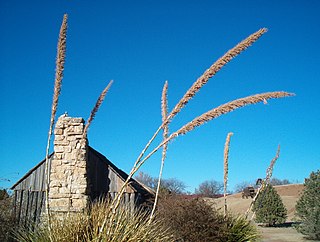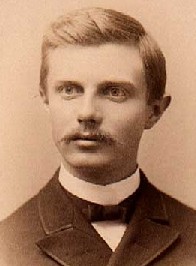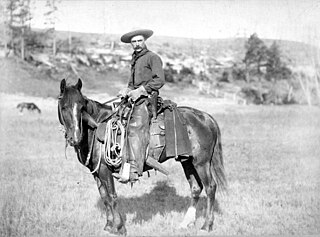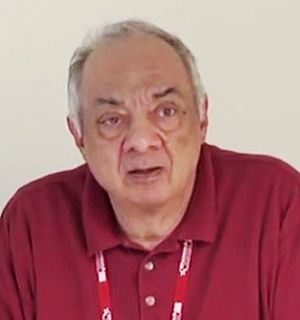Related Research Articles

A frontier is the political and geographical area near or beyond a boundary. A frontier can also be referred to as a "front". The term came from French in the 15th century, with the meaning "borderland"—the region of a country that fronts on another country. Unlike a border—a rigid and clear-cut form of state boundary—in the most general sense a frontier can be fuzzy or diffuse. For example, the frontier between the Eastern United States and the Old West in the 1800s was an area where European American settlements gradually thinned out and gave way to Native American settlements or uninhabited land. The frontier was not always a single continuous area, as California and various large cities were populated before the land that connected those to the East.

Ignatius Loyola Donnelly was an American Congressman, populist writer, and fringe scientist. He is known primarily now for his fringe theories concerning Atlantis, Catastrophism, and Shakespearean authorship, which many modern historians consider to be pseudoscience and pseudohistory. Donnelly's work corresponds to the writings of late-19th and early-20th century figures such as Helena Blavatsky, Rudolf Steiner, and James Churchward.

Frederick Jackson Turner was an American historian during the early 20th century, based at the University of Wisconsin until 1910, and then Harvard University. He was known primarily for his frontier thesis. He trained many PhDs who became well-known historians. He promoted interdisciplinary and quantitative methods, often with an emphasis on the Midwest. His best known publication is his essay "The Significance of the Frontier in American History," the ideas of which formed the frontier thesis. He argued that the moving western frontier exerted a strong influence on American democracy and the American character from the colonial era until 1890. He is also known for his theories of geographical sectionalism. During recent years historians and academics have argued frequently over Turner's work; however, all agree that the frontier thesis has had an enormous effect on historical scholarship.

The American frontier, also known as the Old West or the Wild West, includes the geography, history, folklore, and culture in the forward wave of American expansion in mainland North America that began with European colonial settlements in the early 17th century and ended with the admission of the last few western territories as states in 1912. This era of massive migration and settlement was particularly encouraged by President Thomas Jefferson following the Louisiana Purchase, giving rise to the expansionist attitude known as "Manifest Destiny" and the historians' "Frontier Thesis". The legends, historical events and folklore of the American frontier have embedded themselves into United States culture so much so that the Old West, and the Western genre of media specifically, has become one of the defining periods of American national identity.
The Frontier Thesis or Turner's Thesis is the argument advanced by historian Frederick Jackson Turner in 1893 that a settler colonial exceptionalism, under the guise of American democracy, was formed by appropriation of the rugged American frontier. He stressed the process of "winning a wilderness" to extend the frontier line further for U.S. colonization, and the impact this had on pioneer culture and character. In essence, Indigenous land possesses an "American ingenuity" that settlers are compelled to forcibly appropriate to create cultural identity that differs from their European ancestors. Turner's text follows in a long line of thought within the framework of Manifest Destiny established decades earlier. He stressed in this thesis that American democracy was the primary result, along with egalitarianism, a lack of interest in bourgeoisie or high culture, and violence. "American democracy was born of no theorist's dream; it was not carried in the Susan Constant to Virginia, nor in the Mayflower to Plymouth. It came out of the American forest, and it gained new strength each time it touched a new frontier," said Turner.

Atlantis: The Antediluvian World is a pseudoarchaeological book published in 1882 by Minnesota populist politician Ignatius L. Donnelly, who was born in Philadelphia, Pennsylvania in 1831. Donnelly considered Plato's account of Atlantis as largely factual and suggested that all known ancient civilizations were descended from this lost land.
Godfrey Davies was a respected English historian of the 17th century and member of the research staff of the Huntington Library. The Mississippi Valley Historical Review summarized his contributions by noting: "Through his published works he came to be recognized as a leading authority in seventeenth-century English history, and through his innumerable services to British and American students who have worked at the Huntington Library during the past quarter of a century he made a leading contribution not only to his own but also to many fields of historical scholarship."
Nicholas J. Cull is a historian and professor in the Master's in Public Diplomacy program at the Annenberg School for Communication and Journalism at the University of Southern California. He was the founding director of this program and ran it from 2005 to 2019.

Myron Hubbard Hunt was an American architect whose numerous projects include many noted landmarks in Southern California and Evanston, Illinois. Hunt was elected a Fellow in the American Institute of Architects in 1908.
Francis Paul Prucha was an American historian, professor emeritus of history at Marquette University, and specialist in the relationship between the United States and Native Americans. His work, The Great Father: The United States Government and the American Indians, won the Ray Allen Billington Award and was one of the two finalists for the 1985 Pulitzer Prize in History. It is regarded as a classic among professional historians.
Ray Allen Billington was an American historian focusing his work on the history of the American frontier and the American West, becoming one of the leading defenders of Frederick Jackson Turner's "Frontier Thesis" from the 1950s to the 1970s, expanding the field of the history of the American West. He was a co-founder of the Western History Association in 1961.
Gary Alfred Tomlinson is an American musicologist and the John Hay Whitney Professor of Music and Humanities at Yale University. He was formerly the Annenberg Professor in the Humanities at the University of Pennsylvania. He graduated from the University of California, Berkeley, with a Ph.D., in 1979 with thesis titled Rinuccini, Peri, Monteverdi, and the humanist heritage of opera.
David Joseph Weber was an American historian whose research focused on the history of the Southwestern U.S. and its transition from Spanish and Mexican control to becoming part of the United States. For a period of time, this field of study had largely been ignored, as both United States and Latin American historians concentrated on the central stories in their fields. He "was among the first scholars to focus on the importance of the relationship between Mexico and the United States."

John Edwin Pomfret was an American academic and administrator who served as the director of the Henry E. Huntington Library and Art Gallery and the twentieth president of the College of William & Mary.
Jared Farmer is the Walter H. Annenberg Professor of History at the University of Pennsylvania. He specializes in environmental history, landscape studies, and the American West.
The following works deal with the cultural, political, economic, military, biographical and geologic history of the Midwestern United States.

Richard Joseph Jensen is an American historian, who was professor of history at the University of Illinois, Chicago, from 1973 to 1996. He has worked on American political, social, military, and economic history as well as historiography and quantitative and computer methods. His work includes the Midwestern electoral history, The Winning of the Midwest and Historian's Guide to Statistics.
The Mexican Frontier, 1821–1846: The American Southwest Under Mexico by historian David J. Weber is a history of the part of Mexico's north and northwest that became part of the United States after the Mexican–American War. The book examines territories on the northern frontier of Mexico, including what is now Arizona, California, New Mexico, and Texas, in the twenty-five years after Mexico gained its independence from Spain. Weber emphasizes the role of Mexicans in the region through this period of transition, particularly before and during the Texas war of independence, as well as exploring the region as a whole while acknowledging its distinct communities.
Wilbur R. Jacobs was an American historian, with a special interest in Native American, Western, and Environmental history.
Sylvester Pattie (1782–1828) was a frontiersman in the early United States.
References
- 1 2 3 4 Susan Wladaver-Morgan. "In Memoriam: Martin Ridge (1923-2003)," in Perspectives on History, March 2004.
- ↑ Atkins, Annette. "A Curious Westerner: Martin Ridge, 1923-2003." (2004): 119-119.
- ↑ Vaughan, Alden T. New England Frontier: Puritans and Indians, 1620-1675. University of Oklahoma Press, 1995.
- ↑ Dunaway, Wilma A. The first American frontier: Transition to capitalism in Southern Appalachia, 1700-1860. Univ of North Carolina Press, 1996.